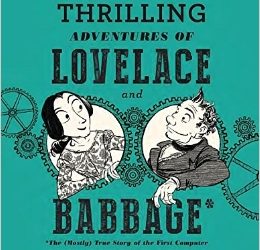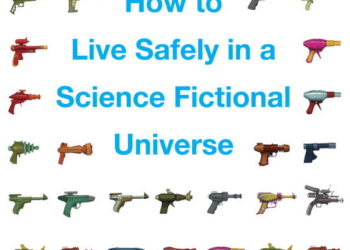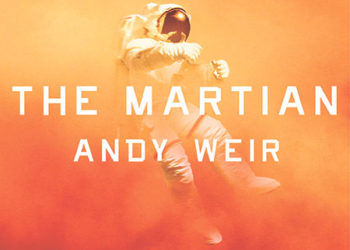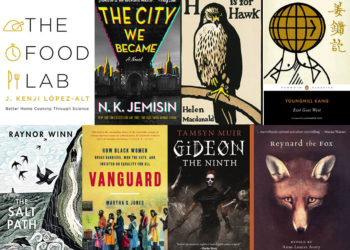Editor’s Note: Every year around the US Thanksgiving holiday, we take a moment to pause and look back on the best books we encountered (not a “best books of 2020″ list, but a list of the best books the Chefs read during 2020 — the books might be classics, a few years old, or brand new). As in all things, this year feels a bit different. We’re all (hopefully) socially-distanced, and largely trapped at home and more in need of diversion and inspiration than ever. So we’ve expanded our list to include any sort of cultural creation or experience our Chefs wanted to share.
2020 has been both an excellent and an extremely difficult year for reading. Yes, our activities are largely curtailed, and for many there’s time to fill that normally would have been occupied with other activities that are currently unsafe. At the same time, reading is a solitary pursuit, and for many, the pandemic has meant not only isolation from community, but also constant immersion in the presence of those with whom one shares a home. Those stolen quiet moments for reading, sitting on a train, a plane, or just a quiet morning at home when everyone else is out, have largely disappeared.
And yet the escape offered by a good book, movie, song, or really any creative endeavor is savored more than ever. I’ll quote once again Neil Gaiman on the importance of escapism:
If you were trapped in an impossible situation, in an unpleasant place, with people who meant you ill, and someone offered you a temporary escape, why wouldn’t you take it? And escapist fiction is just that: fiction that opens a door, shows the sunlight outside, gives you a place to go where you are in control, are with people you want to be with (and books are real places, make no mistake about that); and more importantly, during your escape, books can also give you knowledge about the world and your predicament, give you weapons, give you armour: real things you can take back into your prison. Skills and knowledge and tools you can use to escape for real.
As JRR Tolkien reminded us, the only people who inveigh against escape are jailers.
Hopefully we can provide some escape for you over the long winter. Here’s Part 2 of our list, Part 1 is available here.
Rick Anderson
 Chris Dingman — Peace (5 discs)
Chris Dingman — Peace (5 discs)
When vibraphonist and composer Chris Dingman’s father was at home under hospice care during his last months of life, Dingman moved a vibraphone into his father’s house and improvised music for him designed to soothe and relax him and help him sleep. But his father reacted to the music somewhat differently; he expressed gratitude that it had “open(ed) up patterns of thought and being” for him, going so far as to characterize the music as a “miracle” that “has transformed me over and over again. It has made me stronger, made me want to live life again.” For most listeners, hearing this music out of its original context may not be quite as transformative an experience–how could it be? But the love and warmth that existed between Dingman and his father is everywhere apparent in these compositions, and Dingman’s exceptional skills as a writer and improviser mean that the music is never static or needlessly repetitive or random-sounding; it’s always interesting and frequently complex, while always conveying a sense of gentleness, love, and peace. One could use it as ambient music, but it constantly rewards one’s close attention as well. Frankly, this is the most beautiful and touching recording I’ve heard so far this year.
Charlie Rapple
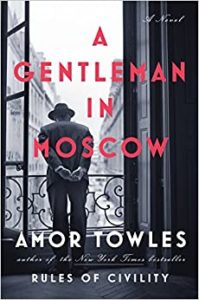 My book of the year is one that I read BC (before COVID). Its gentle joy has stayed with me throughout the year and I’ve lent it eagerly to as many people as I was able to see. It is Amor Towles’ A Gentleman in Moscow. It tells the story of a Russian count, sentenced to house arrest in a grand old Moscow hotel in the 1920s. I liked the Count from the minute he starts his life sentence, consigned from his capacious suite to an attic room, by “bouncing twice on his new mattress to identify the key of the bed springs (G sharp)”. (And I liked Towles as an author for specifying the key.) The storytelling is imaginative, the writing poetic, sketching out and then coloring in a likeable character: the count is whimsical but sparky, principled but not pious. There is some light philosophizing, wittily expressed (“Fate would not have the reputation it has if it simply did what it seemed it would do.”). It brings the period alive, is rich in detail, and has a fine sense of the absurd. We gradually come to see the Count’s subtle skills in orchestrating the world around him, and just at the point when the plot has confirmed that sense of him, Towles has an architect drawing a sort of mechanized doll house with the count “towering over this tableau … with his hand in the crank, ready to set the diners in motion”. It is so apposite, and so elegantly described. There is a sense of magic — people seeming to transport themselves from place to place in the blink of an eye. And gradually what appears as a gently unfolding change of circumstance story, evocatively written, enough in itself, suddenly shifts and gradually accelerates into one with heroes and villains, a plot that makes you sit up with hopes and fears, twists and turns. It is a book that you can’t put down, or can’t turn turn the pages fast enough — but also one to wallow in, to escape into, because of its beautiful writing and the lovely world it evokes. I dived straight into Towles’ back catalogue and also loved The Rules of Civility, set in 1920s New York. But that would have been too similar to my choice for book of 2019 (Manhattan Beach), hence the Count won this year.
My book of the year is one that I read BC (before COVID). Its gentle joy has stayed with me throughout the year and I’ve lent it eagerly to as many people as I was able to see. It is Amor Towles’ A Gentleman in Moscow. It tells the story of a Russian count, sentenced to house arrest in a grand old Moscow hotel in the 1920s. I liked the Count from the minute he starts his life sentence, consigned from his capacious suite to an attic room, by “bouncing twice on his new mattress to identify the key of the bed springs (G sharp)”. (And I liked Towles as an author for specifying the key.) The storytelling is imaginative, the writing poetic, sketching out and then coloring in a likeable character: the count is whimsical but sparky, principled but not pious. There is some light philosophizing, wittily expressed (“Fate would not have the reputation it has if it simply did what it seemed it would do.”). It brings the period alive, is rich in detail, and has a fine sense of the absurd. We gradually come to see the Count’s subtle skills in orchestrating the world around him, and just at the point when the plot has confirmed that sense of him, Towles has an architect drawing a sort of mechanized doll house with the count “towering over this tableau … with his hand in the crank, ready to set the diners in motion”. It is so apposite, and so elegantly described. There is a sense of magic — people seeming to transport themselves from place to place in the blink of an eye. And gradually what appears as a gently unfolding change of circumstance story, evocatively written, enough in itself, suddenly shifts and gradually accelerates into one with heroes and villains, a plot that makes you sit up with hopes and fears, twists and turns. It is a book that you can’t put down, or can’t turn turn the pages fast enough — but also one to wallow in, to escape into, because of its beautiful writing and the lovely world it evokes. I dived straight into Towles’ back catalogue and also loved The Rules of Civility, set in 1920s New York. But that would have been too similar to my choice for book of 2019 (Manhattan Beach), hence the Count won this year.
Judy Luther
When a friend visiting from New York City suggested seeing the “Whitman, Alabama” exhibit at the Philadelphia Museum of Art last year, I did not anticipate that it would be a profoundly moving experience. The exhibit was one of many events planned by the University of Pennsylvania Libraries Kislak Center as part of Whitman at 200: Art and Democracy in honor of the 200th anniversary of Walt Whitman’s birthday.
In 1855 Walt published the initial version of Leaves of Grass which included the poem “Song of Myself” that evolved in subsequent editions to 52 verses. Written in the first person it was highly criticized at the time for focusing on sex, race, religion, immigration, and politics. However, it centered around the idea that everyone is an individual and that we are all connected. Today it is considered the quintessential American poem.
These are really the thoughts of all men in all ages and lands, they are not original with me.
At the museum, past the introductory wall displays, were a few rows of benches facing a screen playing videos of people in Alabama, from all walks of life, reading a verse from the poem, speaking openly and often directly into the camera. Copies of the poem were scattered around for those who wanted to read as well as listen. The videographers had spent a year traveling through Alabama inviting strangers to read a verse of Whitman’s poem, bringing it to life. The video vignettes range from 2-12 minutes and appear on the Whitman Alabama website. There is a 7 minute introduction to the series on YouTube if you want a sample.
The idea was conceived and directed by Jennifer Crandall, Artist-In-Residence at the Alabama Media Group, who was captivated by the people of Alabama and wanted to create a series of portraits using the poem as a common thread.
The South, I think, is hallowed ground, and oftentimes, I think Americans are a little bit ashamed of its past. Rather than turning our backs on it, we need to turn toward it. We need to think closely about what it means to our identity as Americans. [credit Nieman Lab]
The day I headed to the exhibit, I was angry about news that the state legislature in Alabama was taking what I considered to be a backwards stance on women’s rights. Hours later, listening to the southern accents I left the exhibit feeling a deep appreciation for the people of Alabama and remembering the friends I had made during my travels through the state years ago.
Alison Mudditt
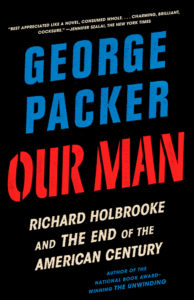 One of the few unarguably good things about 2020 has been so much more time to read – I don’t think I’ve read as many books in a single year since university. And so it’s hard to pick just a few, but I’ll try.
One of the few unarguably good things about 2020 has been so much more time to read – I don’t think I’ve read as many books in a single year since university. And so it’s hard to pick just a few, but I’ll try.
Hands down the best biography I read was George Packer’s portrait of Richard Holbrooke, Our Man: Richard Holbrooke and the End of the American Century. Alongside a mesmerizing portrait of a brilliant, energetic, self-absorbed and deeply flawed man is a sweeping view of American diplomacy from Vietnam through to Afghanistan. Reading it at this time of US isolation, what struck me most was that while American engagement has been critical in so many areas, there are very real limits to American liberalism on the world stage.
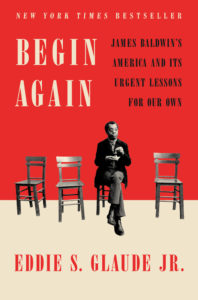 Staying with the biographical theme, my next recommendation is Eddie Glaude’s profoundly moving Begin Again: James Baldwin’s America and Its Urgent Lessons for our Own. It’s actually more like two books: the first half is a tour of Baldwin’s work and the second, the author’s reckoning with Donald Trump’s America through the prism of Baldwin’s work. And it’s here that Glaude is most challenging, grappling with how to act in a country that continues to embrace “the lie that corrupts American life”: the national myth of America as fundamentally good and innocent. I read it slowly over a weekend, often needing to put it aside to absorb and reflect on what I’d read. And ultimately came away hopeful; able, with Glaude, to imagine a time when “that unsettling feeling of being “in but not of” this country would be no more”.
Staying with the biographical theme, my next recommendation is Eddie Glaude’s profoundly moving Begin Again: James Baldwin’s America and Its Urgent Lessons for our Own. It’s actually more like two books: the first half is a tour of Baldwin’s work and the second, the author’s reckoning with Donald Trump’s America through the prism of Baldwin’s work. And it’s here that Glaude is most challenging, grappling with how to act in a country that continues to embrace “the lie that corrupts American life”: the national myth of America as fundamentally good and innocent. I read it slowly over a weekend, often needing to put it aside to absorb and reflect on what I’d read. And ultimately came away hopeful; able, with Glaude, to imagine a time when “that unsettling feeling of being “in but not of” this country would be no more”.
Ending on a lighter note, we’ve been getting our travel kicks this year through food and wine. Yottam Ottolenghi’s Simple has the bold, bright flavors that I love in his food without the usual complexity and long list of ingredients, making it a weeknight go-to. I’ve cooked my way through pretty much all of Melissa Clark’s Dinner in French, turning our summer patio into a little corner of southern France with table linens from Provence and a good Rhone. And we’ve spent numerous evenings in one of our favorite cities/restaurants via Gabriela Camara’s My Mexico City Kitchen. That said, the recent good vaccine news has us hotly debating where to go our first trip once we can safely travel again. In the meantime, bon appetit!
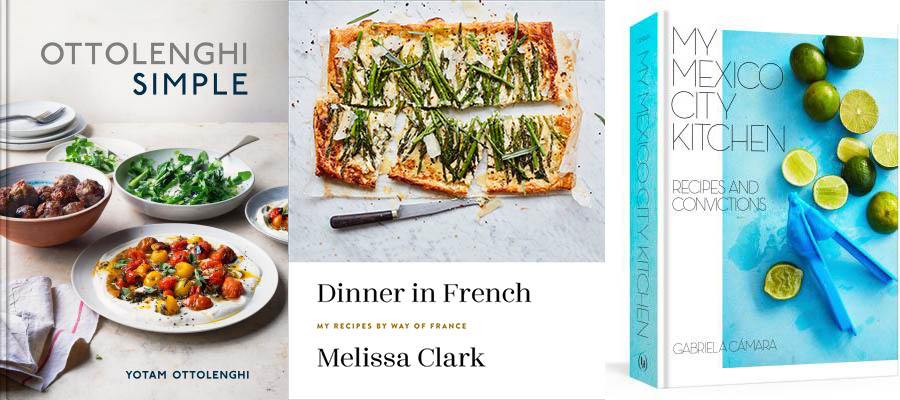
Lettie Conrad
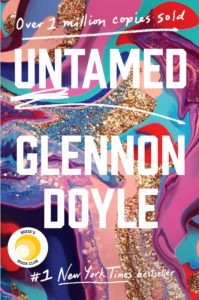 In her best seller, Untamed, activist and author Glennon Doyle reminds us all of what is possible when we can quiet the noise of modern life enough to hear our own voice, and summon the courage to heed that which calls upon us to rise up and be our true selves. Written as both memoir and call to action, Doyle tells her story as a case study in resiliency, recovery, and reinvention. Building upon lessons from her own failures and wins, as well as gems from both modern social-science research and ancient themes of human existence, Doyle unpacks the toolkit of psychological basics we all need to face our hardships and rebuild a life in which we can thrive. In a hilarious dissection of the skewed marketing that sells deodorant to teenagers, Doyle reminds us that, despite legal and cultural wins for equity and justice, we live a world where “our sons and daughters are still being shamed out of their full humanity before they even get dressed in the morning.” While understandably pitched as a tool in liberating girls and women from the bonds of socially constructed inequities, the freedom to be ‘untamed’ applies to those of every gender, age, and race — as having the skill to adapt and heal, rebounding into a life that is self-defined, and not socially defined, is a lesson we can all learn.
In her best seller, Untamed, activist and author Glennon Doyle reminds us all of what is possible when we can quiet the noise of modern life enough to hear our own voice, and summon the courage to heed that which calls upon us to rise up and be our true selves. Written as both memoir and call to action, Doyle tells her story as a case study in resiliency, recovery, and reinvention. Building upon lessons from her own failures and wins, as well as gems from both modern social-science research and ancient themes of human existence, Doyle unpacks the toolkit of psychological basics we all need to face our hardships and rebuild a life in which we can thrive. In a hilarious dissection of the skewed marketing that sells deodorant to teenagers, Doyle reminds us that, despite legal and cultural wins for equity and justice, we live a world where “our sons and daughters are still being shamed out of their full humanity before they even get dressed in the morning.” While understandably pitched as a tool in liberating girls and women from the bonds of socially constructed inequities, the freedom to be ‘untamed’ applies to those of every gender, age, and race — as having the skill to adapt and heal, rebounding into a life that is self-defined, and not socially defined, is a lesson we can all learn.
Jasmine Wallace
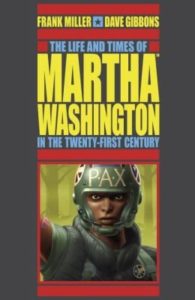 Last year, I was introduced to the colorful world of graphic novels by way of one of my favorite authors Margaret Atwood, in her reinvented graphical version of the classic The Handmaid’s Tale. As I dove further into this world of image driven storytelling, I stumbled up this wonderful tale of the amazing freedom fighter, Martha Washington. The Life and Times of Martha Washington is a beautifully told story of a little girl born into a world of overwhelming injustices and senseless corruption. The authors, Frank Miller and Dave Gibbons, take the reader on an incredible fictional journey through the second American Civil War, life afterwards and even into the depths of the intergalactic cosmos. It is a tale of unwavering resilience, courage, and a search for true righteousness and justice. During a year that reflected so many similarities as portrayed in this imagined universe, I found this fictional tale inspiring and refreshing.
Last year, I was introduced to the colorful world of graphic novels by way of one of my favorite authors Margaret Atwood, in her reinvented graphical version of the classic The Handmaid’s Tale. As I dove further into this world of image driven storytelling, I stumbled up this wonderful tale of the amazing freedom fighter, Martha Washington. The Life and Times of Martha Washington is a beautifully told story of a little girl born into a world of overwhelming injustices and senseless corruption. The authors, Frank Miller and Dave Gibbons, take the reader on an incredible fictional journey through the second American Civil War, life afterwards and even into the depths of the intergalactic cosmos. It is a tale of unwavering resilience, courage, and a search for true righteousness and justice. During a year that reflected so many similarities as portrayed in this imagined universe, I found this fictional tale inspiring and refreshing.
Todd Carpenter
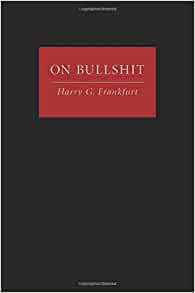 Earlier this fall while raking leaves in my yard, a chapter of an old audio book came up on my phone as iTunes shuffled through all my MP3 files. The book chapter in question was from a popular book in its day, but that had fallen out of my memory. Back in 2005, On Bullshit became a New York Times bestseller and I’d finished it off in a day. Written by a the moral philosopher Harry G. Frankfurt, the book deserves the second look I gave it this fall and I encourage you all to revisit as well.
Earlier this fall while raking leaves in my yard, a chapter of an old audio book came up on my phone as iTunes shuffled through all my MP3 files. The book chapter in question was from a popular book in its day, but that had fallen out of my memory. Back in 2005, On Bullshit became a New York Times bestseller and I’d finished it off in a day. Written by a the moral philosopher Harry G. Frankfurt, the book deserves the second look I gave it this fall and I encourage you all to revisit as well.
For those expecting a funny or even ironic take by an esteemed Professor focusing his attention on a crass term, the book will be something of a disappointment. It really isn’t a joke. Unlike the comedy of South Park or The Colbert Report of its time, the work is a more serious consideration of the term and moral philosophy than most who pick it up at first glance might expect.
Overall, the book is a reasonable entry into the world of modern philosophical thinking and how philosophy approaches questions and moral quandaries. We could all use a bit more concentrated thought about the terms we use, and the underlying beliefs that underpin them. Within the academy it has had its detractors, critiquing it as too narrow, or too simplistic, or simply outdated even for the time, but it isn’t intended to be a scholarly monograph. Certainly, not everyone will enjoy the rabbit holes that Frankfurt goes down. For example the epistemological discussion of Wittgenstein and Pascal’s argument over the statement “feeling like a runover dog” is the kind of thing only a philosophy professor would relish. However, the discussion of St. Augustine and his definition and classification of lies (from On Lying), and therefore the key distinctions between lying and bullshit are particularly relevant today.
What caught my ear and drew me back to the work was the chapter on how we “Can’t Lie Unless We Know the Truth.” Frankfurt posits that it is the constraint of the truth that importantly distinguishes between the liar and the bullshitter. This quote summarized for me the most pertinent aspect:
For the bullshitter however, all these bets are off. He is neither on the side of the true, nor on the side of the false. His eye is not on the facts at all, as the eyes of the honest man and the liar are – except insofar as they may be pertinent to his interest in getting away with what he says. He doesn’t care whether the things he says describe reality correctly. He just picks them out, or makes them, up to suit his purpose.
Another fascinating consideration is that the original essay was developed in the era of Ronald Reagan’s second administration. The essay first appeared “On Bullshit” in the Raritan Quarterly Review journal in 1986 and also appeared in an anthology of Frankfurt’s work published by Cambridge University Press, The Importance of What We Care About in 1988. It is almost quaint to reflect this this was also the era in which the often-repeated Daniel Patrick Moynihan quote, “Everyone is entitled to his own opinion, but not his own facts,” was received as a rebuke that was taken seriously when it was published in the Washington Post in 1983 (and previously by Schlesinger and others). The ability of Frankfurt’s critique on the liar or bullshitter has certainly lost some of its power to restrain behavior in the intervening years.
In the nearly three and a half decades from the publication of Frankfurt’s original paper and the 15 years since this book was released, the world of the consideration of fact, of lies, of bullshit and its impact on those who encounter it is more relevant than ever. As we consider our current information landscape, Frankfurt’s framing is useful for today’s headlines and the ecosystems that we have grown to inhabit. His book is stimulating not so much as how it could be applied to the soon-to-be-former occupant of the White House, but how the book presents an interesting perspective both about how our collective discourse has changed in the past three decades and what it might mean for the future.
Tim Vines
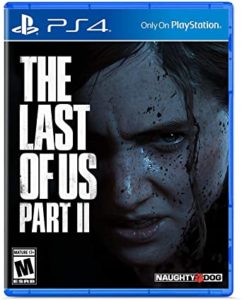 My culture experience of the year has been a video game – a game that probably counts as the biggest release of 2020 on any platform, and one that has set new standards for in-game storytelling and immersion. It’s called The Last of Us Part II, and it came out on the PlayStation 4 in mid-June.
My culture experience of the year has been a video game – a game that probably counts as the biggest release of 2020 on any platform, and one that has set new standards for in-game storytelling and immersion. It’s called The Last of Us Part II, and it came out on the PlayStation 4 in mid-June.
The original Last of Us came out in 2013, and followed hard-bitten Joel as he escorts 14-year-old Ellie across a post-zombie-apocalypse United States in the hope that she holds the secret of a cure. That story packs an emotional punch, particularly the end, and dwells on the nature of the sacrifices parents make for children.
In Last of Us II, Ellie is 19, older, somewhat wiser, and brutally well adapted to life in the zombie apocalypse. The theme here is revenge, and the youthful certainty that killing enemies will make everything alright. It’s here that the video game format takes the experience to the next level. When reading a book or watching a movie, you can cringe or rage at the protagonists’ terrible choices, but in the game you have to enact that choice with the controls. In some situations, the game just waits for you to push the next button, and in others it’s kill or be killed. When combined with the plethora of genuinely touching moments between the characters, you end up being very emotionally invested in what’s on the screen.
Last of Us II is also a thoroughly modern game: the main characters are complicated, powerful women, one of whom is a lesbian, and a transgender character features prominently as well. The accessibility features are mind-blowing – over 60 different options to accommodate people with impaired vision or hearing, motion sickness or issues with the controls – and the graphics stunning. For a taste, here’s the trailer. Did I mention you can also play a guitar in game?
Discussion
2 Thoughts on "Chefs’ Selections: Best Books Read (and more!) During 2020, Part 2"
Richard Holbrooke was an incredible man and this is another prod to read Packer’s book. The film made by his son is worth watching as well (it came out in 2016 I think. At the time, I said to a friend that seeing how Hillary Clinton handled Holbrooke in that movie made me think she would be a great President if elected. It’s a shame we will never find out).
Yes Lettie! “Untamed” was incredible and I know I’ll find myself going back to it time and again.
